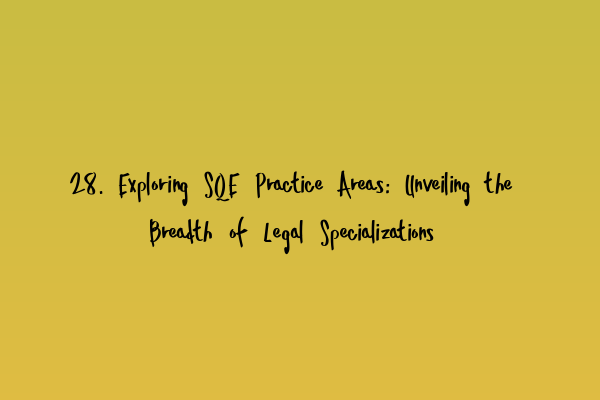28. Exploring SQE Practice Areas: Unveiling the Breadth of Legal Specializations
As a prospective solicitor, understanding the breadth of legal specializations is crucial for your SQE exam preparation. The Solicitors Qualifying Examination (SQE) assesses candidates on their knowledge and skills in various practice areas. Familiarizing yourself with these practice areas will not only enhance your performance in the exam but also equip you with the necessary information to pursue your desired legal career.
In this article, we will take a comprehensive look at the different practice areas covered in the SQE exams and provide you with valuable insights to help you navigate through your journey towards becoming a qualified solicitor.
1. Business Law
Business law is a broad area that encompasses various legal issues pertaining to businesses and commercial transactions. It includes contract law, company law, corporate finance, and intellectual property law, among others. An understanding of business law is essential for solicitors advising corporate clients and handling commercial matters.
Preparing for the SQE exams, you should familiarize yourself with key topics such as contract formation and interpretation, company formation and structure, directors’ duties, intellectual property rights, and the legal implications of mergers and acquisitions.
For additional practice in business law, you can utilize the SQE 1 Practice Exam Questions and SQE 1 Practice Mocks FLK1 FLK2 resources.
2. Criminal Law
Criminal law focuses on offenses committed against the state, ranging from minor infractions to more serious crimes. This practice area involves understanding criminal statutes, criminal procedure, and the principles of criminal liability. As a solicitor, you may find yourself representing clients accused of criminal offenses or providing legal advice in criminal matters.
For the SQE exams, you should familiarize yourself with key concepts such as the elements of criminal offenses, defenses available to accused persons, and the procedural aspects of criminal trials. Additionally, knowledge of sentencing guidelines and criminal appeal procedures will prove invaluable.
3. Family Law
Family law deals with legal matters relating to marriage, divorce, child custody, and adoption, among others. It covers both civil and legal aspects of family relationships and incorporates various statutes and case law. As a solicitor specializing in family law, you will advise clients on issues such as property settlements, child support, and visitation rights.
To prepare for the SQE exams, it is important to have a strong foundation in the legal principles governing marriage, divorce, child custody, and financial settlements. Understanding the intricacies of family law will ensure that you are well-equipped to provide accurate and comprehensive advice to your clients.
4. Property Law
Property law deals with legal issues relating to the ownership, transfer, and use of real and personal property. This practice area encompasses areas such as residential and commercial real estate transactions, landlord-tenant disputes, and property development. As a solicitor specializing in property law, you will assist clients in buying, selling, and leasing properties, as well as resolving property-related disputes.
In preparation for the SQE exams, you should familiarize yourself with key concepts such as property rights, conveyancing procedures, lease agreements, and land registration systems. Understanding the legal framework surrounding property law will be crucial in your future practice as a solicitor.
For additional resources and exam preparation materials, you can explore the SQE 2 Preparation Courses offered.
5. Employment Law
Employment law governs the legal relationship between employers and employees. It covers a wide range of issues including employment contracts, workplace discrimination, unfair dismissals, and collective bargaining. As a solicitor specializing in employment law, you will advise both employers and employees on their legal rights and obligations.
For the SQE exams, you should have a good understanding of the legal principles governing employment contracts, discrimination laws, and the procedures for resolving employment disputes. Additionally, keeping up-to-date with recent developments in employment law will give you a competitive edge in your future legal career.
6. The Breadth of Legal Specializations
These practice areas represent just a small portion of the breadth of legal specializations covered in the SQE exams. Other areas to consider include litigation, immigration law, intellectual property law, and environmental law, among many others.
By exploring the various practice areas and gaining a solid understanding of the legal principles and practical applications, you will be well-positioned to excel in your SQE exams and embark on a successful legal career.
To further enhance your preparation for the SQE exams, you may consider enrolling in SQE 1 Preparation Courses and staying up-to-date with the SRA SQE Exam Dates to plan your study schedule effectively.
Conclusion
As you embark on your journey towards becoming a qualified solicitor, it is essential to acquaint yourself with the variety of practice areas covered in the SQE exams. Building a strong foundation in these areas will not only benefit your exam preparation but also set you on the right path to a successful legal career.
